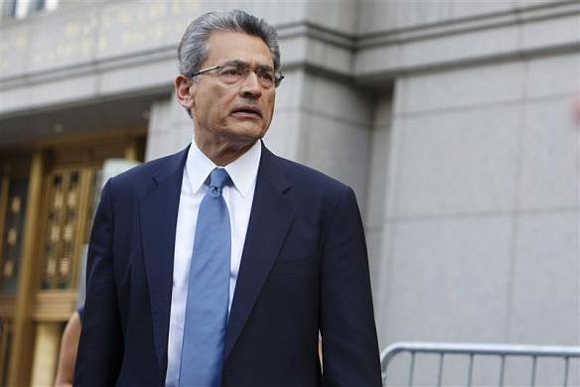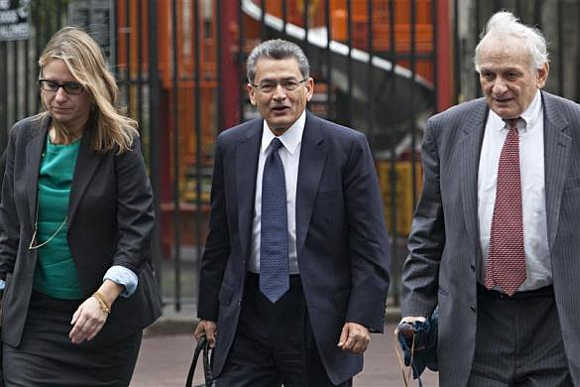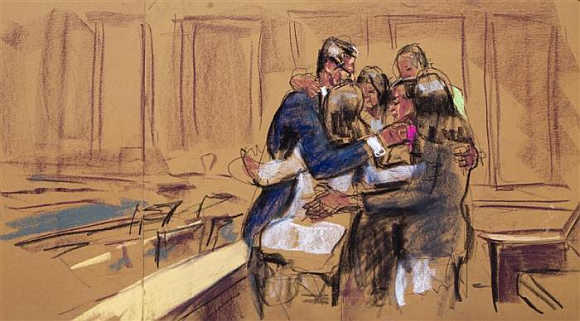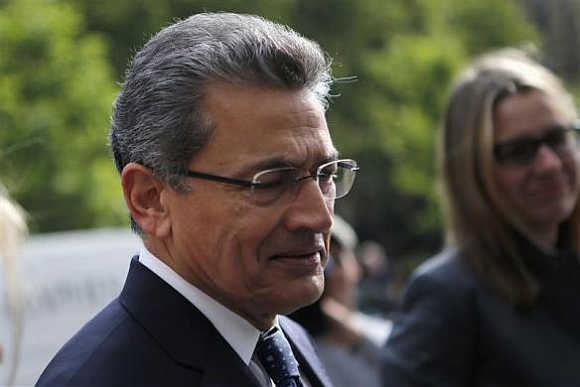 | « Back to article | Print this article |
Reaction to Gupta shows maturity that India lacks
The nuanced US reaction to Rajat Gupta's fall shows greater maturity than the extremes we go to in India, writes Shubhashis Gangopadhyay.
Rajat Gupta has been sentenced to two years of imprisonment for what the US justice system considered to be insider trading. Gupta has been a poster boy for India, rising to the highest echelons of business and society - both nationally and internationally. His rise has been meteoric and yet, from what I gather from some of those who knew him and me, he was a humble soul with both feet grounded in the land and culture he grew up in.
This particular incident, therefore, has come as a shock to many. It has been like a betrayal to those who held that Gupta could do no wrong. I am afraid that now, as happens often, people will come out claiming that they knew that Gupta had been doing shady things. They will generate anecdotes from unidentified or dubious sources.
People who have held him in high esteem and cannot believe what has happened will find fault with the US judicial system; some will blame his good friend Raj Rajaratnam for luring him, nay entrapping him; some will blame the person who turned state witness to avoid a jail term, while others will refer to the Indian crab mentality (pulling down people who are more successful) when discussing the government prosecutor in the case, who is of Indian origin.
Click NEXT to read more...
Reaction to Gupta shows maturity that India lacks
And, in the process, we will forget to learn a lot that is to be learnt from this incident. Let us go through some of them. First, no one is God and there is no reason to indulge in hero-worship. One should appreciate and acknowledge the actions of people and not start worshipping the successful and good people behind highly desirable acts.
A good action is to be commended and a bad action is to be condemned. The person behind either of this is not be worshipped, or alternately, condemned. No one could put this better than the sentencing US judge. While mentioning the good soul that Gupta was, he also talked about the fact that many bad things are done by very good people. And the laws in society are supposed to reduce such happenings.
The only way to do so is to punish the act, regardless of how good or bad is the person committing it. Second, a good legal system is blind to the exact standing of the person behind any act. Gupta was powerful, politically and socially. Many petitions were sent to the sentencing judge by the high and mighty, including Bill Gates and Warren Buffett, asking for leniency during sentencing.
Click NEXT to read more...
Reaction to Gupta shows maturity that India lacks
These were publicly acknowledged by the persons sending them. In other words, the high and mighty were not worried about falling from grace in the eyes of the American public for coming out in open support of Gupta, even after he was convicted of insider trading.
Is it because the American public does not care for Gupta's infractions, or that the high and mighty could be least bothered by what the public thinks about them? Actually, I think it is neither - and there is something we can learn there. Unlike us, they are willing to accept both the good and the bad in their people. A good person is someone who does more good than bad; a better person is one whose good actions far outweigh her bad actions.
They also feel, I believe, that it is unlikely that a person will stay in society around everyone else and never do anything that can be ethically questioned. That person would, indeed, be a saint. And saints are few in number. What this allows them to do is to critically evaluate the actions of any person regardless of who the person is or what other actions she has committed.
Click NEXT to read more...
Reaction to Gupta shows maturity that India lacks
Thus, the fact that you are related to a politician or the child of a powerful government official, or simply that you have tonnes of money has no bearing on whether or not you will be held accountable for any particular act. The flip side of this is that you will also not be pilloried simply because you have made an error in judgement.
After all, God does not live around us. To me, the Rajat Gupta incident is not a lesson on how the mighty can fall. It is more a lesson in how a mature society deals with its people and the actions they commit. No one is a god or a demon. In India, on the other hand, we go from one extreme to the other. For example, we are restricted from questioning our "stars".
Even simple things like a cartoon, or a tongue-in-cheek public statement about a powerful public figure, can land people in jail. Questioning our own past, especially the things we seem to be proud of as a nation or a community, can land us in serious trouble. And, when someone is powerful, she is God.
Click NEXT to read more...
Reaction to Gupta shows maturity that India lacks
So, when the police catch up with someone who has committed an illegal act, the first thing that everyone checks is the social and political standing of the person. If the person is powerful, the police must have made a mistake; if the person has been caught for petty theft before, the person must be capable of murder.
Either way, we forget the action and tend to judge the person. Though Gupta said he has lost his reputation, there are many who feel that he is, basically, a good and ethical person. The same people also feel that the insider trading activity of which he has been convicted should not go unpunished.
And, while he would have been a better person if he had not done it, he continues to be a person some of whose other actions are best emulated.
The writer is research director of IDF and director of the school of humanities and social sciences at SNU





